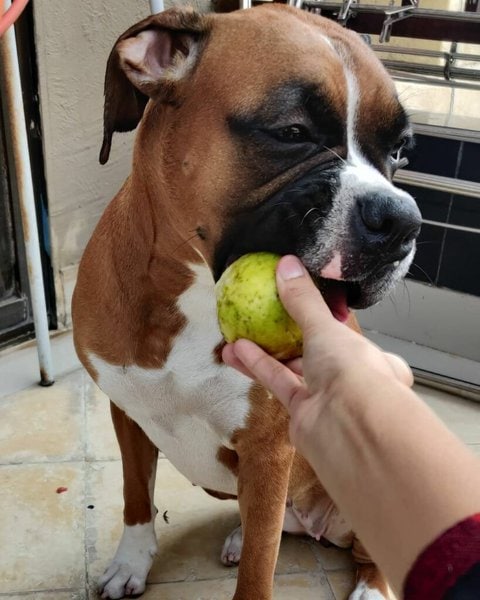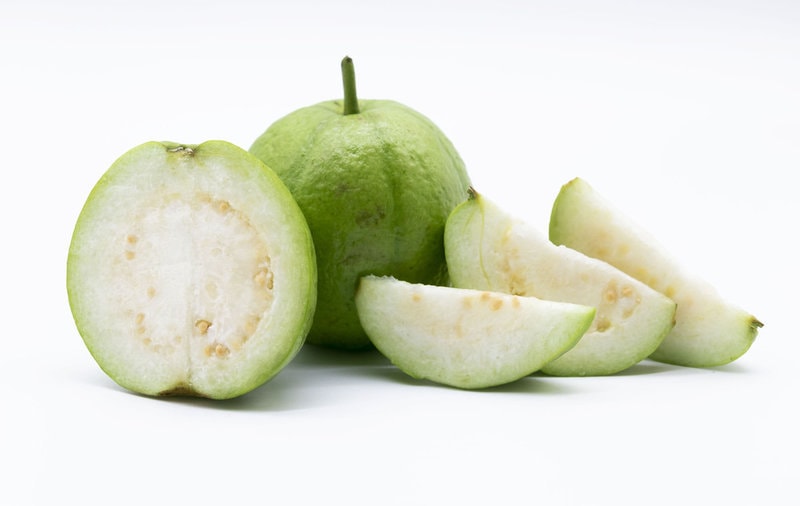Guava is a tropical fruit classified as an ultimate superfood. Its soft, pink-colored fruit flesh is abundant with nutrients and minerals. The inside of the guava isn’t the only highly nutritious part. The rind and leaves are also rich nutrient sources. If you’re wondering whether your pooch can partake of the glorious guava fruit, wonder no more.
Yes, dogs can and should eat guava. Aside from the pleasant taste and succulent pasty texture, guava has many more nutrients than most fruits. For instance, guava contains four times more vitamin C than oranges, serving as a great immune booster in dogs.
In this article, you’ll discover the amazing health benefits dogs enjoy from eating guava. You’ll also learn about possible downsides to allowing your dog to eat guava, how to feed your dog guava, what kind of guava dogs can eat, and whether dogs can eat guava leaves. But first, let’s review the many benefits guava will have on your furry friend, starting with improved gut health.
What Are The Health Benefits Of Feeding Dogs Guava?

Guava is beneficial to dogs in many ways. Below is a list of positive effects guava has on a dog’s health.
High Fiber Content
Fiber improves the overall health of bacteria in the gut, which helps in rapid digestion and eases bowel movements. Bacteria in the gut, called gut flora, help break down food in the large intestine, increasing catabolism.
A slight issue with gut flora is that, as living organisms, they have little nutrients to feed on. Most digested food quickly absorbs into the bloodstream. The remainder collects in the large intestine.
The small intestines and other digestive organs lack the appropriate enzymes to break down fiber. Hence, most fiber consumed in your dog’s diet travels to the large intestine, supplying the healthy bacteria with enough nutrients to commence the fermentation processes and effectively break down the fiber content.
Introducing high-fiber guava is a wise decision to improve your canine’s gut health. Indigestion has always been a significant concern, so dog owners worry about introducing new food to their furry buddies. All caring dog parents ought to provide high-fiber food. Guava happens to be a superb option.
High In Vitamins A, C, and K
Guava is exceptionally rich in vitamins, especially vitamins A, C, and K, which improve the general health of your pooch.
For instance, vitamin A is the chief vitamin responsible for enriching the nerve cells in the eye. When present in the bloodstream in sufficient proportions, vitamin A can significantly improve dog eyesight and reduce the possibility of blindness.
Vitamin C is another potent vitamin in guava. It is known for nourishing and rejuvenating skin cells, among other health benefits. High vitamin C in guava should help make your dog’s coat lustrous and thick.
Lastly, guava is high in vitamin K. This is another reason why guavas are beneficial to your canine pal.
Veterinarians recommend and administer vitamin K to injured dogs. Vitamin K plays a vital role in healing damaged tissues. Vitamin K1, the primary source of vitamin K, also helps stop internal bleeding when dogs accidentally ingest rodent poison.
High In Iron
Iron is the principal mineral in charge of energizing hemoglobin in red blood cells—cells that carry dissolved oxygen to all organs in the body. The absence of sufficient iron in dogs’ diets can cause a shortage called anemia.
According to the National Library of Science, anemia can occur if your furry buddy strictly consumes homemade or vegetarian meals that don’t contain iron in the right proportions.
Since guava is high in iron, feeding your canine guava can help increase iron supply to strengthen red blood cells. This increase boosts oxygen transportation and glucose distribution, energizing the entire body.
Contains Antioxidants
Guava contains antioxidants that manifest as ascorbic acid, quercetin, gallic acid, ferulic acid, and other acidic variants. The antioxidants in guava improve the dogs’ immune systems and increase their lifespans by slowing cells’ aging process. Antioxidants also neutralize the effect of free radicals that cause certain types of cancer in dogs.
What Are The Risks Of Feeding Guavas To Dogs?

Several potential health complications may arise from introducing guava to dogs. Some are listed below:
Obesity
Guava is sweet because of its high sugar content. Guava may not be harmful in small doses, but overindulging may cause spikes in blood sugar. Such spikes may lead to obesity and other health complications.
Therefore, dogs with a diabetic history shouldn’t have guava. The high sugar content may worsen their health in the long run.
Bloating And Stooling
Owing to the high fiber content in guavas, consuming the fruit in excess leads to fiber accumulation in the large intestines. Undigested fiber remaining in a pup’s stomach causes gas production and passage of watery stool.
Not to worry. Bloating from excess fiber doesn’t require treatment. Bloating usually goes away within a few hours if dogs avoid additional fiber.
Allergies
Although uncommon, your dear Fido can have an allergic reaction after consuming guava. Depending on several circumstances like dog breed and degree of exposure, allergies could range from mild to severe. Symptoms of allergies can manifest as hives, itching, or watery eyes.
Cyanide Poisoning
Many fruits have seeds that contain cyanide, and guava is among them. However, unlike other fruits, the cyanide content in a guava seed is minute and insufficient to cause poisoning.
But as with any excess, eating too many guava seeds causes cyanide to accumulate and become toxic. Err on the side of caution, and remove all seeds in the fruit before feeding your doggie.
What Kinds Of Guavas Can Dogs Eat?

Dogs can actually eat all kinds of guavas. Some of the most common types include red guavas, white guavas, Thai guavas, pineapple guavas, and apple guavas. When ripe, all of them pose no threat to your doggie if eaten in moderation.
Can Dogs Eat Guava Leaves?
No, dogs shouldn’t eat guava leaves because they’re difficult to digest. Undigested food quickly accumulates in the intestine and blocks food passage. This block leads to severe abdominal pains in dogs. While some folks may trumpet the medicinal effect of boiled guava leaves, giving them your pooch isn’t necessary. The nutrients in the fruit are more than sufficient.
How Do I Feed Guava To My Dog?
Feeding guava to your dog can be rather straightforward. Follow these simple steps:
Wash And De-seed
Since guava is eaten raw, washing eliminates germs and harmful pathogens like salmonella. After washing, take care to remove the seeds, preventing the occurrence of cyanide poisoning.
After de-seeding, use a sharp knife to peel off the rind. Then slice the guava into bite-sized pieces.
Remember, some folks feed guava to dogs with the rind unpeeled because the greenback of the guava contains more vitamin C. However, to prevent a choking hazard or indigestion resulting from your furry buddy swallowing a difficult-to-chew substance, it’s best to play it safe and peel off the rind.

Feed Little At First
Allergies, taste preferences, and other factors can influence how receptive your dear Fido will be to guava. So, the best way to introduce guava or any other fruit is to start with a small piece and observe your canine pal’s reaction. If your doggie responds positively, then you can increase the number of slices. Otherwise, immediately stop giving guava to your dog.
Feed Sparingly
One requirement for a healthy and balanced dog diet is to limit treats to no more than 10% of the total diet. Feed dogs in moderation since too much guava can cause obesity, stomach upset, and other unpleasant health issues.





